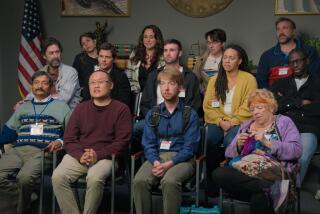Editorial: A (slightly) better way to pick a jury
- Share via
Most criminal trials last just a few days, but jury service can take much longer than that, in part because it takes prosecutors and defense lawyers such a long time to pick a jury.
That’s reasonable, up to a point. Prospective jurors need to be questioned, and those who clearly exhibit a prejudice or otherwise show that they can’t be relied on to hear and understand the evidence and then render a fair verdict certainly should be dismissed for cause.
But that’s not what takes most of the time. The jury selection process drags out because lawyers try to carefully cast juries to their liking by using the peremptory challenges that allow them to reject jurors for no stated reason at all. It’s a far cry from the random selection process that is supposed to form the basis of the jury system.
Lawyers have in the past used peremptory challenges to cull juries of racial groups or particular professions or religious beliefs without ever having to admit what they’re doing. Court rulings have cracked down on some of these abuses, but peremptory challenges are still so subject to misuse as to call into question whether any prospective juror should ever be dismissed for anything other than good cause.
Extremely modest curbs on excessive and time-consuming peremptory challenges have been snuffed out year after year by California lawmakers reacting to pressure from prosecutors and criminal defense lawyers. That’s especially frustrating now, in the wake of the Legislature’s deep budget cuts that necessitate regional courthouse closures and long daily commutes by prospective jurors to distant courtrooms.
This year the state Senate passed a reform that is almost embarrassing in its modesty. SB 794 would apply only to misdemeanor trials, not felony cases. It would reduce the astounding 10 peremptory challenges allowed in California (that’s 10 each for the prosecution and the defense, or 20 prospective jurors who reported to the courthouse dismissed without cause) to a still-cushy five for each side. In the smallest misdemeanor cases, in which the punishment is 90 days in jail or less — and seriously, the notion that any person facing such a short stretch would ever actually do any time in the overcrowded jails of today is more a philosophical construct than reality — peremptory challenges would be reduced from six to five per side.
And here’s the punch line: The reform only lasts for two years, after which the more numerous peremptory challenges for misdemeanor cases kick back in.
A real reform would be to eliminate no-cause removal of jurors entirely, but this slight and temporary reform at least inches in the right direction. The Assembly should adopt the bill and send it to the governor.
More to Read
A cure for the common opinion
Get thought-provoking perspectives with our weekly newsletter.
You may occasionally receive promotional content from the Los Angeles Times.









